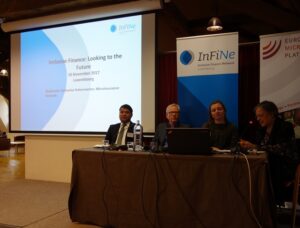The last European Microfinance Week provided the opportunity for InFiNe.lu members to have a look at the evolution of the inclusive finance sector with a session specially organised for them: “Inclusive Finance: Looking to the future”.
 With the global development challenges such as climate change, migration and the growing importance of digital technology, the inclusive finance sector is evolving. Estelle Lahaye, CGAP Financial Sector Specialist, Ian Taylor, Mastercard Vice President Business Development Europe, Government and Public Sector, Sachin Vankalas, LuxFLAG Director Operations and Sustainability and InFiNe.lu Board Member exchanged their views on the future of inclusive finance. The moderator was Katharine Pulvermacher, Executive Director of the Microinsurance Network.
With the global development challenges such as climate change, migration and the growing importance of digital technology, the inclusive finance sector is evolving. Estelle Lahaye, CGAP Financial Sector Specialist, Ian Taylor, Mastercard Vice President Business Development Europe, Government and Public Sector, Sachin Vankalas, LuxFLAG Director Operations and Sustainability and InFiNe.lu Board Member exchanged their views on the future of inclusive finance. The moderator was Katharine Pulvermacher, Executive Director of the Microinsurance Network.
To introduce the discussion, Katharine Pulvermacher stressed that inclusive finance goes far beyond simply having access to a bank account.
The session began with Estelle Lahaye presenting the research paper published by CGAP in July 2017 Vision of the Future : Financial Inclusion 2025. She briefly reviewed the state of inclusive finance in the world and the evolution of economies in emerging countries. It is observed that the world population is becoming more urban and the population is younger in the South than in the North; the global poverty has reduced but inequality is increasing; the poor work mainly in rural areas and the informal economy. The 4 main forces shaping future development identified in this CGAP research are: digital technology, globalisation, migration and the changing world of work. These forces have a direct impact on inclusive finance. Estelle Lahaye underlined that financial services should be perceived as motor for development and that the financial services ecosystem is changing, notably with the arrival of FinTechs. More and more data are available, creating new challenges and new types of exclusion can emerge. The role of Governments and leaders is crucial dealing with these challenges.
Following this presentation, Sachin Vankalas outlined the main challenges faced more specifically by microfinance sector investors and the present state of MIVs. The investors follow the global changes and no longer only invest in projects supporting solely microfinance, but also in the educational, environmental and health care sectors. The traditional inclusive finance investment sectors are diversifying. Ian Taylor then highlighted Mastercard’s active work in the development of new technological products enabling a greater number of people to have access to financial services. This development work is at the heart of Mastercard’s commercial business. Regarding the access to financial services for refugees and migrants, it is essential for the providers of financial services to adapt their products to these customers as the regional and international migratory flows will continue in the future.
Finally, the panel recognised and highlighted the need for specialists to provide technical assistance to microfinance institutions based in the South, to help them deal with these global challenges and support them in these changes.
©InFiNe.lu
InFiNe is the Luxembourg platform that brings together public, private and civil society actors involved in inclusive finance. The value of InFiNe lies in the wide range of expertise characterised by the diversity of its members.
With the support of

Inclusive Finance Network Luxembourg
39, rue Glesener
L-1631 Luxembourg
G.-D. de Luxembourg
Tel: +352 28 37 15 09
![]()
R.C.S. : F 9956
Legal notice
Privacy notice
Picture 1 © Pallab Seth
